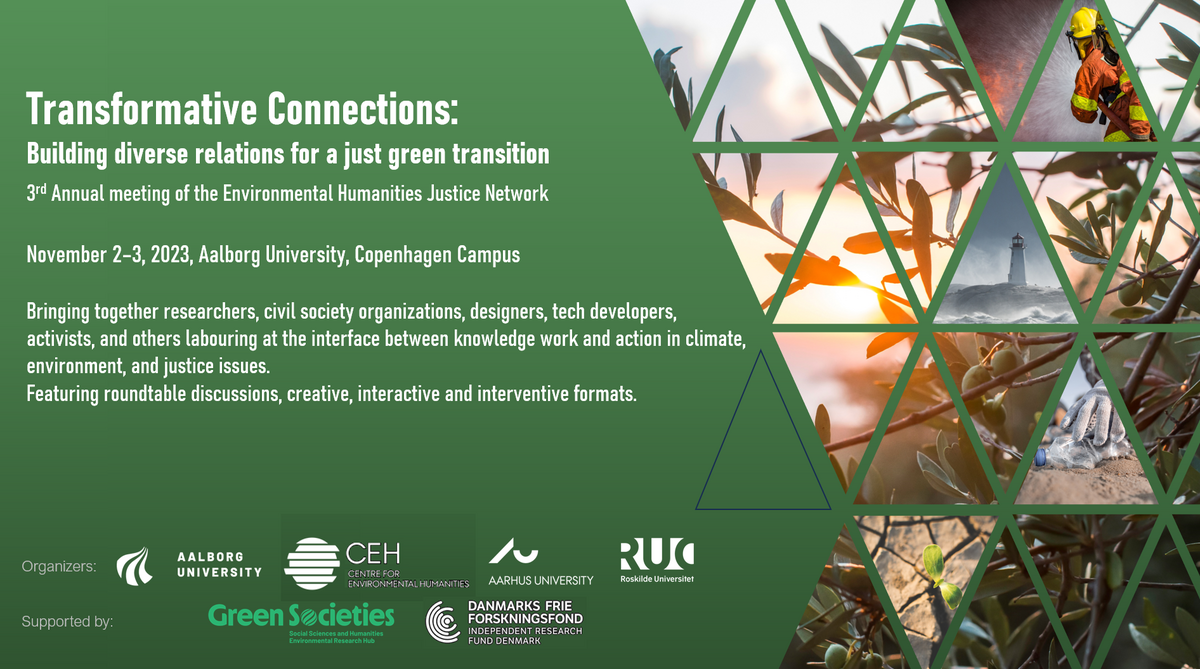3rd Annual Conference of the EHJustice Network: “Transformative Connections: Building Diverse Relations for a Just Green Transition”
The third and final annual conference of the EHJustice network, bringing together scholars, civil society organizations, designers, tech developers, activists, and others labouring at the interface between knowledge work and action in climate, environment, and justice issues. Featuring roundtable discussions, creative, interactive and interventive formats.
Info about event
Time
Location
Aalborg University, Copenhagen Campus, A. C. Meyers Vænge 15, 2450 København SV
Organizer
Aalborg University, Copenhagen Campus
A. C. Meyers Vænge 15, 2450 København SV

Conference theme
Civil society movements and scholarship have long influenced each other in fruitful ways. In recent decades, dialogues between activists and scholars in the humanities and the social sciences have resulted in important innovations in fields such as gender studies, postcolonial studies, migration, or social movement studies. This event resumes this tradition in order to develop conceptual approaches and practical engagements for the Environmental Humanities (EH) and for climate action and green transition more broadly. The coming transformation of our economic models and material environments calls out for collaborations across civil society, the environmental humanities, engineering, designers and tech developers to develop analytical tools, new knowledge practices, and the design and building of environments and technologies for life.
Aiming to probe and redefine boundaries between scholarship and civil society, and to generate new modes of collaboration between and beyond the environmental humanities this event gathers and connects scholars with designers, artists, civil society organizations through a meeting that explores building diverse relations for a just green transition. We ask:
- How can the environmental humanities and civil society collaborate in the promotion of transformations towards a “greener” and environmentally just future that favour social, cultural and political diversity?
- What kind of connections can we foster to develop models of and for positive change?
- What practical initiatives can we build to bridge the gap between knowledge and action in climate, environment, and justice issues?
- What tools are missing to help build diverse relations for a just green transition?
With this year's meeting, we intend to bring together scholarly and activist experiences that speak from different backgrounds or that crisscross the boundaries of North and South. The meeting will feature scholars and activists reflecting multiple approaches to questions of justice linked to their situated and specific contexts. It will follow dialogue-table format alongside more experimental forms of participation
Organizing team
The conference is organized by the Research Network for Global Justice and the Environmental Humanities—or, simply, the EHJustice network—which is a cross-disciplinary collaboration between researchers from the universities of Aalborg, Roskilde, and Aarhus, and the Centre for Environmental Humanities (CEH). This conference is lead by network members from Aalborg University. Contact: Astrid Oberborbeck Andersen (aoan@ikl.aau.dk) and Malayna Raftopoulos (raftopoulos@dps.aau.dk).
EHJustice core network members
Astrid Oberborbeck Andersen, Georg Fischer, Heather Swanson, Kristine Samson, Malayna Raftopoulos, and Mikkel Fugl Eskjær.
The EHJustice network is funded by the Independent Research Fund Denmark. It orchestrates a set of conversations on global environmental justice at the intersection of academia and civil society (focusing on activists and NGOs), seeking to strengthen both the environmental humanities in Denmark and its links to civil society, while also developing tools and concepts for a new public environmental humanities that connects Denmark to the world. More information on the network webpage.
